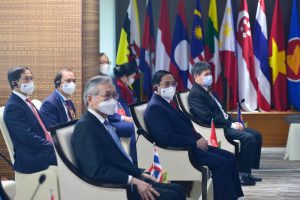The chair and secretary-general of the Association of Southeast Asian Nations (ASEAN) plan to travel to Myanmar this week for talks with the military junta, as the Southeast Asian bloc attempts to push forward with attempts to resolve the country’s crisis.
The news was reported yesterday by the Reuters news agency, citing several diplomatic sources with knowledge of the trip. According to the report, ASEAN Secretary-General Lim Jock Hoi and Erywan Yusof, the second minister for foreign affairs for Brunei, which currently holds ASEAN’s rotating chairmanship, are scheduled to meet this week with leaders of the junta that seized power in February.
Reuters reported that the pair will also meet with “other stakeholders,” although it remains unclear if this will involve members of the National Unity Government or other opponents of the junta.
The military coup of February 1 has tipped Myanmar into a crisis with no clear end. Four months on, the military regime continues to face nationwide resistance and work stoppages, in addition to increasing acts of violent sabotage. At least 841 people have been killed by the security forces since the coup, according to the Assistance Association for Political Prisoners, a local advocacy group, while more than 5,000 have been arrested.
This week’s mooted trip comes more than a month after leaders from the 10 ASEAN states, including Myanmar junta leader Sen. Gen. Min Aung Hlaing, convened a special meeting in Jakarta. The meeting established five points of consensus about the Myanmar crisis: the cessation of violence; “constructive dialogue” between the various parties; the appointment of an ASEAN special envoy; the facilitation of humanitarian aid; and the deployment of the special envoy to Myanmar to meet with the various contending parties.
Since then, however, there has been little progress on any of the five points, while the Tatmadaw continues to use violence against civilians and launch offensives that have displaced of thousands of people in border areas. In particular, the most straightforward of these five points – the appointment of a special envoy – has yet to happen.
The Reuters article fleshed out some of the reasons for the delays, claiming that ASEAN member states remained divided over the choice of envoy, the scope of their mandate, and the length of their term. The article claimed that Brunei has proposed that the envoy only hold the position for the rest of the year, at which point it would then be reviewed by Cambodia, which holds ASEAN’s chair in 2022. Brunei also proposed limiting the envoy’s job to mediating on fly-in visits rather than basing them in Myanmar.
According to the Reuters article, these conditions were seen by several ASEAN states as fatally undermining the stature and leverage of the envoy. “ASEAN is hemorrhaging. There is a lot of intra-ASEAN diplomatic sniping. There is unhappiness all around,” it quoted one diplomatic source as saying. (Today, Indonesian Foreign Minister Retno Marsudi announced that the appointment of a special envoy “must be done immediately and communication with all parties must be maintained.”)
The article also pointed to divisions over ASEAN’s widely criticized decision to reject a draft United Nations resolution seeking to impose an arms embargo on Myanmar last week. While the resolution was non-binding and hence mostly symbolic, Thailand and Singapore ensured that ASEAN requested the clause be removed, presumably to preserve the fragile regional consensus attained at the Jakarta summit.
The article reveals the extent to which Myanmar’s crisis has touched on a number of problems in ASEAN. The first is its difficulty in attaining a consensus among its 10 member states, especially on any issue directly involving one of them. The second is a wide divergence in views over how much of an interventionist position the bloc should take both in general, and in the case of Myanmar in particular.
Together, they ensure that the only process that ASEAN can support is one that Myanmar’s junta feels comfortable with. This may be about the best that can be hoped for at this stage, but it suggests that the success of any diplomatic process is likely to have as much to do with the conditions on the ground in Myanmar as the efforts of outside actors.
The junta has already rejected any visit by an ASEAN envoy until it has achieved “the stability and security of the country.” This week’s trip is thus unlikely to advance any of the five points of consensus. At best, it will be the second step in what looks like being a very long path.

































